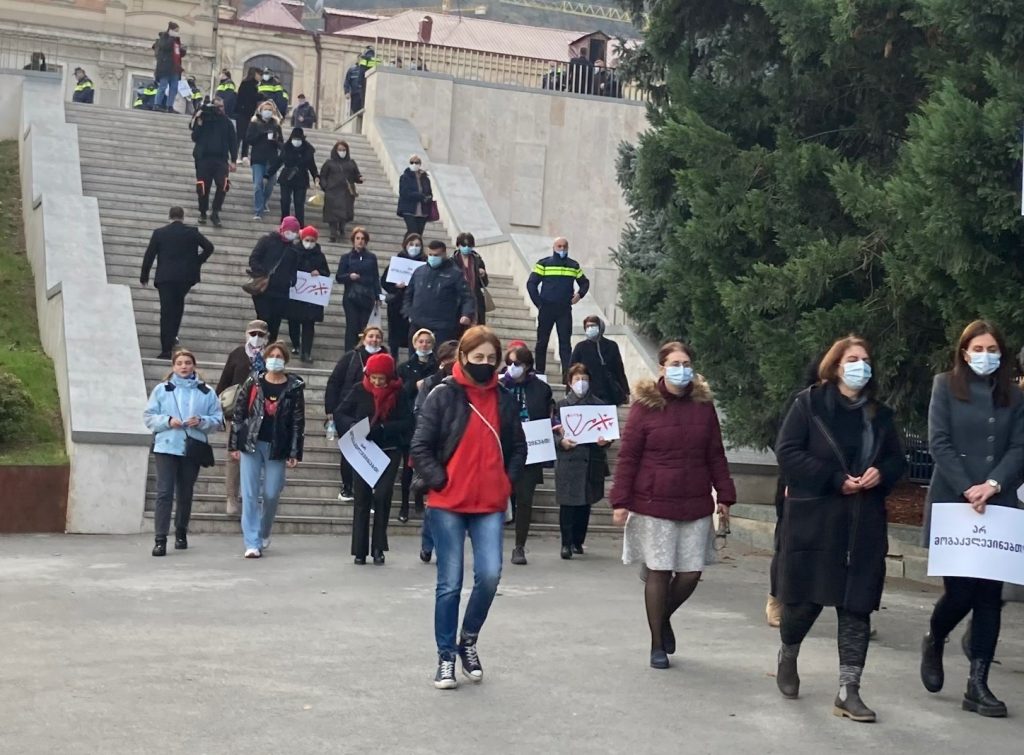Saakashvili’s Civil and Political Rights Must be Protected

Mikheil Saakashvili, a former president of Georgia, has been on a hunger strike since his detention on 1 October 2021. The doctors subsequently reported that Saakashvili’s health condition became critical, with multiple life-threatening health complications, and demanded his immediate transfer to the multi-profile hospital from the prison hospital where he is currently kept against his will.
Saakashvili’s lawyers also noted that the Georgian authorities are violating his rights by refusing to transfer him to his trial hearing at Tbilisi City Court, citing the risks of his supporters obstructing the convoy, as well as health concerns due to his weeks-long hunger strike.
Civil Rights Defenders call on Georgian authorities to ensure the safety of Mikheil Saakashvili, and, per the recommendation of the doctors’ concilium and the Public Defender’s office to ensure his safety and proper treatment. Saakashvili should be also allowed to be present at his ongoing trial hearing in the Tbilisi City Court. It is Georgian authorities’ obligation to protect Saakashvili’s civil and political rights, namely, his right to health and fair trial.
Under the European Convention on Human Rights, every person has the right to life (Article 2), the right not to be subjected to torture (Article 3) as well as the right to a fair trial (Article 6), and currently, Georgian authorities violate all of these rights in Saakashvili’s case.
According to the European Convention, the state has a positive obligation to take appropriate steps to safeguard the lives of those within their jurisdiction. Saakashvili’s presence in the prison hospital against his will and in conflict with established practice constitutes a risk to his life and health under article 2 of the Convention. The lack of appropriate medical care may also violate article 3 of the Convention. Thus, due to the lack of access to his personal doctor and the necessary medical equipment, Mikheil Saakashvili’s right not to be subjected to torture and degrading treatment are being violated by the Georgian authorities. Finally, Saakashvili has not been guaranteed basic procedural rights such as the right to attend his own trial, which amounts to violation of article 6 of the Convention.
Since the transfer of the prisoner at the multi-profile civil hospital is a common practice in Georgia, the discussion on this issue started earlier, when the doctor Nikoloz Kipshidze and Saakashvili’s lawyers, including Nika Gvaramia and Dimitri Sadzaglishvili, demanded it. Instead, on November 8, Saakashvili was transferred to the prison hospital against his will.
The authorities claimed that no prisoners should be given privileges and that Saakashvili would be treated as any other prisoner. However, Public Defender of Georgia Nino Lomjaria noted that, during the past year, no inmate has been transferred to the prison hospital #18 from the Rustavi prison #12, where convicted former officials, police, and security officers are held. “Statements about Mikheil Saakashvili being treated the same way as other inmates are not true. Rather, transferring an inmate from prison #12 to prison hospital #18 is an unusual case defying a common practice, because others are usually taken to civilian establishments [for treatment],” Lomjaria stated.
The ex-president’s lawyers expressed their strong concerns regarding his presence in the prison hospital, citing safety reasons and the lack of necessary medical equipment in that facility.
On 10 November, the European Court of Human Rights released an interim ruling on Saakashvili’s case, urging him to end the hunger strike – an appeal that is typically a part of the case law on hunger strikers. The Court instructed the Government of Georgia to provide Strasbourg with detailed information on Saakashvili’s health condition and the medical care provided to him in the prison hospital, including information regarding the treatment that is available in prison, by 24 November. Georgian authorities were instructed to ensure his safety in the prison hospital and to provide medical care during the post hunger strike period. According to the European Court of Human Rights, if the Georgian government fails to take these measures, it can be found guilty of violating Article 34 of the European Convention on Human Rights.
On 12 November, 20 local civil society organizations addressed the Council of Europe’s Committee for the Prevention of Torture and Inhuman or Degrading Treatment or Punishment (CPT), calling for an ad hoc visit to the Georgian prison system and monitoring of the situation of the jailed ex-president.
Key Georgian watchdogs claimed that they have been witnessing daily the “inhumane and degrading treatment” of the former president, manifested in “gross violation of his rights” as a hunger-striking prisoner and subsequently, a patient of the #18 prison hospital.
Elene Khoshtaria, an opposition MP from Droa Party, was also on a hunger strike from 2 November until 19 November, demanding Saakashvili’s transfer to the multi-profile hospital. On 14 November, nine lawmakers from the United National Movement parliamentary bloc also started a hunger strike with a similar demand.
On 19 November, the Georgian government offered Saakashvili to transfer him to the military hospital. According to United National Movement party member Eka Kherkheulidze, Saakashvili demanded a meeting with the consul of Ukraine in Georgia and his lawyer Nika Gvaramia to make his transfer in agreement with them.
Earlier, Public Defender of Ukraine Lyudmila Denisova also expressed her concerns about the conditions of Saakashvili’s imprisonment after visiting him in prison. Georgian authorities denied her any subsequent visits to Saakashvili, despite the fact that the former Georgian president is a Ukrainian citizen.


